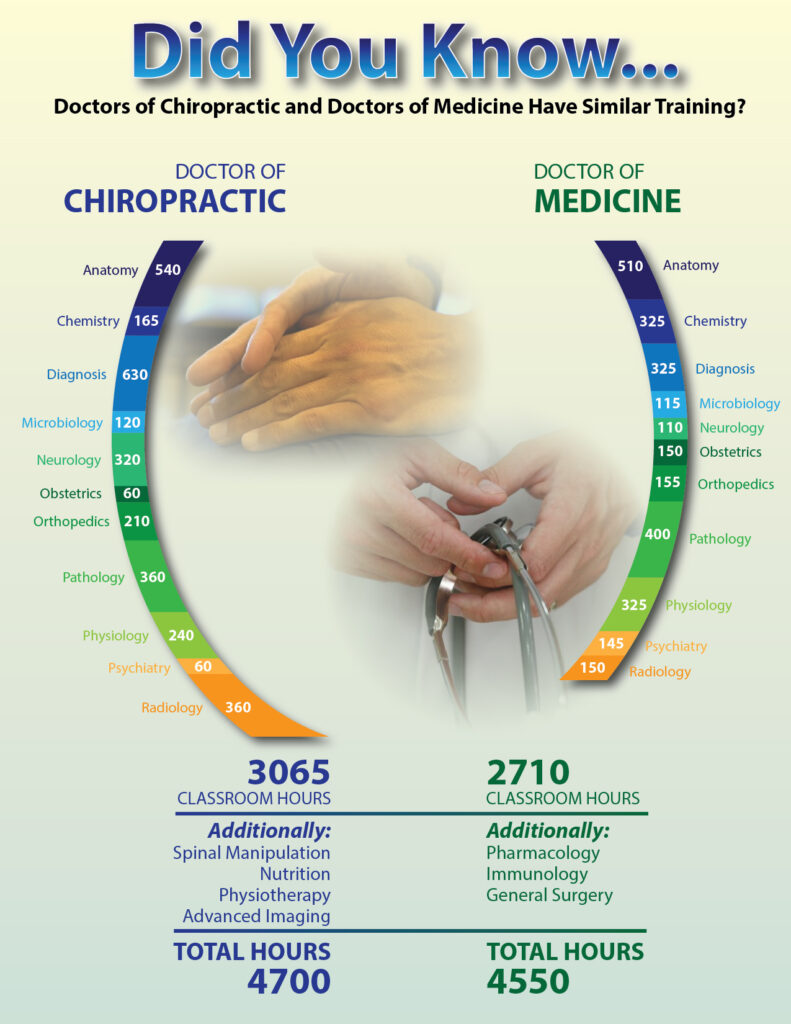Frequently Asked Questions
Doctors of Chiropractic (DCs) care for patients of all ages, with a variety of health conditions. They are especially well known for their expertise in caring for patients with back pain, neck pain and headaches using their highly skilled manipulations or chiropractic adjustments. DCs also care for patients with a wide range of injuries and disorders of the musculoskeletal system, which includes the muscles, ligaments and joints. These painful conditions may involve or impact the nervous system, which can cause referred pain and dysfunction distant to the region of injury. In addition, chiropractors offer advice to patients on diet, nutrition, exercise, healthy habits, and occupational and lifestyle modification.
Chiropractic is widely recognized as one of the safest non-drug, non-invasive forms of health care available for the treatment of neuromusculoskeletal complaints. Although chiropractic has an excellent safety record, no health treatment is completely free of potential adverse effects.
Neck pain and some types of headaches are treated through precise cervical manipulation. Cervical manipulation, often called a neck adjustment, works to improve joint mobility in the neck, restoring range of motion and reducing muscle spasm, which helps relieve pressure and tension. Neck manipulation, when performed by a skilled and well educated professional such as a doctor of chiropractic, is a remarkably safe procedure. If you are visiting your doctor of chiropractic with upper-neck pain or headache, be very specific about your symptoms. This will help your doctor of chiropractic offer the safest and most effective treatment, even if it involves referral to another healthcare provider.
The Centers for Disease Control and Prevention (CDC) has reported that overuse and abuse of prescription opioid pain medications is among the leading causes of accidental death in the United States.
Chiropractors are well-trained professionals who provide patients with safe, effective care for a variety of common conditions. Their extensive education prepares them to identify patients who have special risk factors and to ensure those patients receive the most appropriate care, even if that requires referral to a medical specialist.
Yes. ChiroPros is one of the only chiropractic offices in the area that continues to participate with some insurance plans.
 Doctors of chiropractic are educated as primary-contact healthcare providers, with an emphasis on diagnosis and treatment of conditions related to the musculoskeletal system (the muscles, ligaments and joints of the spine and extremities) and the nerves that supply them. Educational requirements for doctors of chiropractic are among the most stringent of any of the healthcare professions. The typical applicant for chiropractic college has already acquired nearly four years of pre-medical undergraduate college education, including courses in biology, inorganic and organic chemistry, physics, psychology and related lab work.
Doctors of chiropractic are educated as primary-contact healthcare providers, with an emphasis on diagnosis and treatment of conditions related to the musculoskeletal system (the muscles, ligaments and joints of the spine and extremities) and the nerves that supply them. Educational requirements for doctors of chiropractic are among the most stringent of any of the healthcare professions. The typical applicant for chiropractic college has already acquired nearly four years of pre-medical undergraduate college education, including courses in biology, inorganic and organic chemistry, physics, psychology and related lab work.
Once accepted into an accredited chiropractic college (Dr. Newquist attended National University of Health Sciences), the requirements become even more demanding — four to five academic years of professional study are the standard. Doctors of chiropractic are educated in orthopedics, neurology, physiology, human anatomy, clinical diagnosis including laboratory procedures, diagnostic imaging, exercise, nutrition, rehabilitation and more. Because chiropractic care includes highly skilled manipulation and adjusting techniques, a significant portion of time is spent in clinical technique training to master these important manipulative procedures. In total, the chiropractic college curriculum includes a minimum of 4,700 hours of classroom, spinal manipulation, nutrition, physiotherapy and advanced imaging. The course of study is approved by the Council on Chiropractic Education, an accrediting agency that is recognized by the U.S. Department of Education.
The hands-on nature of the chiropractic treatment is essentially what requires patients to visit the chiropractor a number of times. To be treated by a chiropractor, a patient needs to be in his or her office. In contrast, a course of treatment from medical doctors often involves a pre-established plan that is conducted at home (i.e. taking a course of antibiotics once a day for a couple of weeks). A chiropractor may provide acute, chronic, and/or preventive care, thus making a certain number of visits sometimes necessary. Your chiropractor should tell you the extent of treatment recommended and how long you can expect it to last depending upon the diagnosis.
Functional medicine is a systematic biology-based approach that focuses on identifying and addressing the root cause of the client’s problems…whether it’s overweight, underweight, gastrointestinal issues, inflammatory issues, and more. Each symptom or differential diagnosis may be one of many contributing factors to a person’s overall condition.
Functional medicine is an individualized, patient-centered, science-based approach to healthcare that looks beyond symptom resolution to identify why illness occurs, then address those root causes to restore health.
While conventional medicine focuses on using medication to reduce symptoms, functional medicine empowers patients and practitioners to work as a team to resolve the complex, underlying causes of disease or disorders to promote optimal wellness through diet, exercise and lifestyle changes.
The purpose of the nutrition consult is to gather information from you via a detailed metabolic assessment form covering multiple categories, such as any medical and gastrointestinal complaints, food sensitivities, eating habits, etc.; identify goals together, and formulate a strategic plan to meet those goals.
- Weight loss (e.g., macro-specific, Keto, The Zone, HcG, evaluating current habits, and an array of other options)
- Sports performance enhancement
- Muscle gain
- Gastrointestinal complaints
- Preparing for pregnancy
- Post-natal nutrition
- Peri-Menopause/Menopause
- Inflammatory issues
- Autoimmune disorders
- Laboratory testing available
Not at all. These are 1-on-1 appointments in a private setting. Each solution is individually tailored, as no two people are the same or have the same needs.
